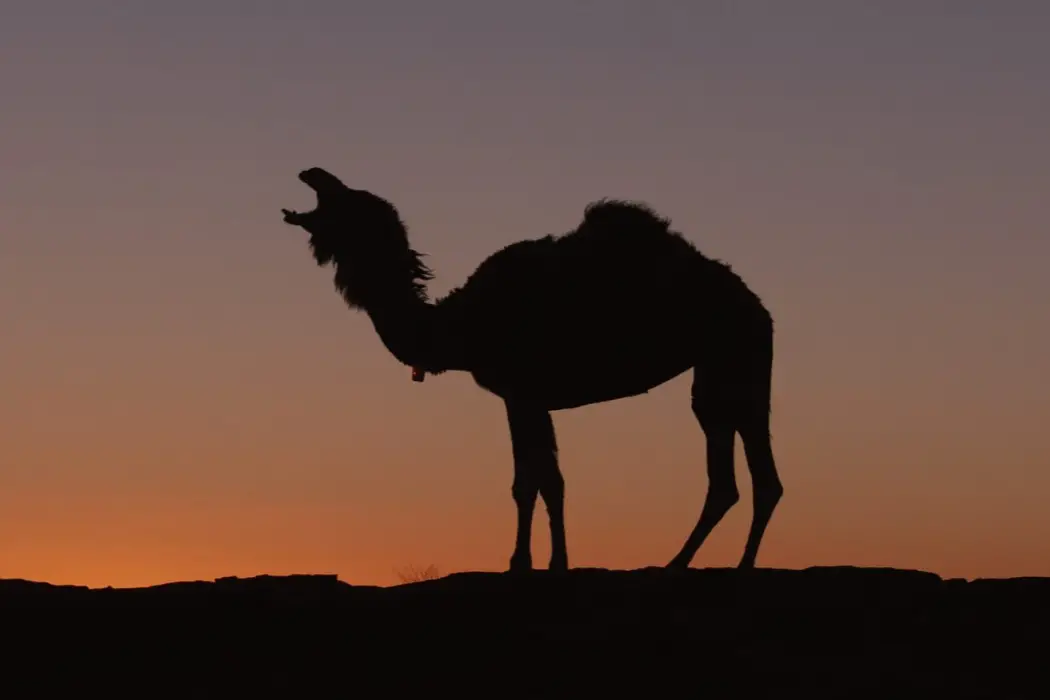JUDAS COLLAR: The Camel’s Clutch

Alex is a 28 year-old West Australian who has a…
In an effort to curb the number of feral camels in northern Western Australia, the practice known as “Judas Camels” was proposed. The basic idea involves fastening a single camel with a satellite tracked collar, stalking them back to their herd, then wiping out all of the clustered strays in one fell swoop. Scientifically it sounds rational, but when rendered in the real by the talented team of writer/director Alison James and producer Brooke Silcox in their latest short Judas Collar, that we grasp the devastating scope of this operation with a fully sobering effect.
Balance By Beacon
Judas Collar starts off in silence, introducing an edenic lushness unfolding with graceful blitheness, as a group of camels rest before they are suddenly spotted by a helicopter whose human occupants only seek to end their peaceful situation. This disruption is candidly depicted as these hordes are chased across Western Australia’s vast and climatically flat topography, with these families of shaggy haired creatures dusting up the desert’s rich beige sand across their ill-fated pursuits.
As they’ve been ‘”betrayed” by the one tagged member, the horde is swiftly thinned down by the business end of an ominous rifle scope. For resources sake, the collared victim is left alive, left to scout for a new family – only for the whole ordeal to repeat itself once again. Despite studies that suggest that these tracked animals do not undergo any trauma – nor do they seek companionship as often as thought – within the prism of Alison James’ script, which is seared by Ash Gibson Greig’s pleading cello score, makes for a strong antithetical statement for an opposing analysis.

There’s something Kafkaesque about the central camel’s existence; an absurd Sisyphus cycle where any moment of peace, any fleeting second of serenity is shattered by the return of the grim blue helicopter’s whirring arrival, signifying the lingering shadow of death itself – always looming and ready to strike at any moment. Gazing upon this plight prompts an existential sense of desolation, for not only the continued treatment of these animals, but also as a microcosm of our generally brutal treatment of animals worldwide.
Judas Collar‘s closing shots project the lone traitor against beautifully warm golden hour textures, presenting the eternal loneliness of the collared camel against the twilighted spotlight that returns him to what he is; not a target, not a traitor, not a statistic, but a doomed creature dominated by forces it cannot see or understand – there’s something very religious invoked within this conclusion, indicative of it’s titular device’s ironic nickname.
Judas Collar: Conclusion
Reminiscent of Joseph Losey’s oft-forgotten cult thriller Figures in a Landscape, Alison James playfully distorts our sense of scale and perspective; these large majestic humpbacks that physically overshadow us are essentially shrunk into woolly dots streaking across the sand once under the purview of the unnamed individuals who hunt them. With lateral echoes to David Attenborough’s reverential observations of the animal kingdom, Judas Collar poetically wields its message with an unspoken but clear affront to such violent practices, with beguiling results.
Judas Collar will have a limited 10 day online release on 4th November, more information can be found here: https://judascollar.com/#watch
Does content like this matter to you?
Become a Member and support film journalism. Unlock access to all of Film Inquiry`s great articles. Join a community of like-minded readers who are passionate about cinema - get access to our private members Network, give back to independent filmmakers, and more.













